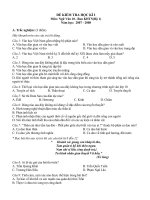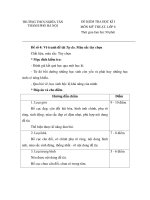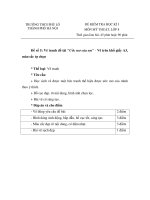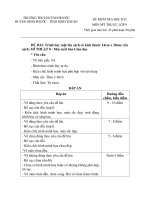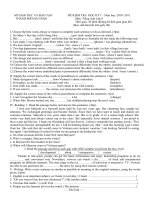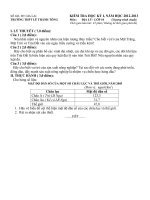ĐỀ KIỂM TRA HỌC KÌ I ( 2010-2011) LỚP : 12 pps
Bạn đang xem bản rút gọn của tài liệu. Xem và tải ngay bản đầy đủ của tài liệu tại đây (62.58 KB, 3 trang )
SỞ GD-ĐT DAKLAK ĐỀ KIỂM TRA HỌC KÌ I ( 2010-2011)
TRƯỜNG PTTH VIỆT ĐỨC LỚP : 12
I Choose the best answer:
1). Which of the following words doesn't contain the final /d/ sound:
a). Tolerated b). Occupied c). Involved d). Determined
2). the students in my class like learning English.
a). Most b). Most of c). Many d). The number of
3). Young people are always keen to do good things that benefit the community.
a). Useful b). Eager c). Interesting d). Reluctant
4). What did our teacher say?
- She advised us honest in the exams.
a). Be b). Being c). To be d). For being
5). Say and do
a). Few / many b). Many / few c). Little / much d). Much / little
6). English is the language of communication.
a). Effective b). Native c). Traditional d). International
7). Which of the following words is stressed on the first syllable:
a). Canadian b). Occupation c). Possession d). Access
8). The opposite of "ill" in the word " ill-prepared" is
a). Badly b). Healthy c). Good d). Well
9). Did he give thought for his future job?
a). Some b). Many c). A large number of d). A great deal of
10). Nothing could him.
a). Satisfies b). Satisfaction c). Satisfactory d). Satisfy
11). She has very knowledge of that matter.
a). A little b). Few c). Little d). Many
12). We are determined to get over the problems.
a). Master b). Overcome c). Encounter d). Solve
13). It's to believe that he passed the exam.
a). Difficulty b). Hard c). Difficultly d). Hardly
14). A person who gives lectures at a college or university is a
a). Teacher b). Student c). Supervisor d). Lecturer
15). Find a mistake in the sentence :The students seemed very nervously before the final exam.
A B C D
16). Carbon dioxide occurs in the air in
a). Natural form b). Natural c). Naturally d). Nature
17). A car is without petrol.
a). Speechless b). Restless c). Useless d). Endless
18). You aren't aware the time, are you? You're always late work!
a). For / of b). In / for c). Of / for d). On / for
19). Would you mind helping me?
a). Ok, thanks b). No, thanks c). Sorry, I can't right now. d). I forget
20). You burn the garbage ; and you dig a hole to bury it.
a). Must / should b). Shouldn't / d' better c). Should / d' rather not d). May / could
21). Stress and tiredness often lead to lack of
a). Concentrate b). Concentrator c). Concentrated d). Concentration
22). I am with waiting here doing nothing .
a). Busy b). Popular c). Bored d). Angry
23). Tail-pipe emission refers to
a). Garbage b). Engine exhaust c). Home-heating d). Lightning
24). He lost control of his temper and ………………his anger.
a). give way to b). take advantage of c). make fun of d). lose track of
25).Mexico City , …………….has a population of over 10 million , is probably the fastest growing city in the world .
a). who b). which c). where d). when
II. Read the text carefully and choose the correct answer:
More than two hundred years ago , the term environmental pollution was quite strange to people . They lived healthily , drank pure
water , and breathed fresh air. Nowadays , the situation is quite different . People all over the world are worried about things that are
happening to the environment .Actually it is man that is destroying the surroundings with many kinds of wastes .Everybody knows
that motorbikes and cars emit dangerous gases that cause poisonous air and cancer , but no one wants to travel on foot or by bicycle .
Manufacturers also know that wastes from factories make water and soil polluted , but they do not want to spend a lot of their money
on treating the wastes safely . Scattering rubbish is bad for our health , but no one wants to spend time burying it. Is it worth talking a
lot about pollution?
26). More than two hundred years ago
A. the environment was polluted as much as it is today. B. people knew nothing about environmental pollution.
C. air was polluted badly. D. people were faced with pollution.
27). In former days , people
A. led a healthy life B. lived in the polluted environment.
C. were worried about pollution. D. drank contaminated water.
28). Nowadays , many people are concerned about
A. the destruction of the poisonous air. B. the polluted water.
C. the wastes from the factories. D. the pollution of the environment.
29). Everybody knows that cars emits dangerous gases
A. so they do not travel by cars B. so they prefer traveling by bicycle.
C. but they still prefer traveling by car. D. and they enjoy traveling on foot.
30). Factory owners
A. know nothing about the pollution B . have no awareness of pollution.
C. treat wastes from their factories safely. D. do not want to spend money on treating the wastes safely.
31). It’s harmful to our health
A. if rubbish is spread over our area. B. if we don’t scatter our rubbish.
C. if we spend time on gathering rubbish. D. if rubbish is buried.
III. Choose A , B , C or D to fill in each blank in the test:
The (32) of alternative resources of energy has resulted in different directions . Many communities are
(33) garbage and other biological waste products to (34) electricity .
(35) work is being done to make synthetic fuels from coals , or coal tars . But to date , that process has
proved expensive . Some experts are trying (36) revive hydroelectric power (37) is derived from
streams and rivers . Fifty years ago, hydroelectric power provided one third (38) the electricity used in the
United States , but today it (39) only four per cent .The oceans are another source of energy . Scientists are
studying ways to change the (40) of ocean currents , tides and waves into electricity.
32). A. search B. study C. research D. invention
33). A. emitting B. erupting C. burning D. throwing
34). A. make B. produce C. do D. create
35). A. experiment B. experimental C. experienced D. different
36). A. on B. to C. from D. into
37). A. who B. which C. where D. whose
38). A. from B. on C. to D. of
39). A. supply B. provide C. supplies D. provision
40). A. power B. energy C. strength D. supply
Ðp n
Câu : 01. Tolerated
Câu : 02. Most of
Câu : 03. Eager
Câu : 04. To be
Câu : 05. Little / much
Câu : 06. International
Câu : 07. Access
Câu : 08. Well
Câu : 09. A great deal of
Câu : 10. Satisfy
Câu : 11. Little
Câu : 12. Overcome
Câu : 13. Hard
Câu : 14. Lecturer
Câu : 15. Nervously
Câu : 16. Natural form
Câu : 17. Useless
Câu : 18. Of / for
Câu : 19. Sorry, I can't right now.
Câu : 20. Shouldn't / d' better
Câu : 21. Concentration
Câu : 22. Bored
Câu : 23. Engine exhaust
Câu : 24. Give way to
Câu : 25. Which
II. Read the text carefully and choose the correct answer:
26). More than two hundred years ago
A. the environment was polluted as much as it is today. B. people knew nothing about environmental pollution.
C. air was polluted badly. D. people were faced with pollution.
27). In former days , people
A. led a healthy life B. lived in the polluted environment.
C. were worried about pollution. D. drank contaminated water.
28). Nowadays , many people are concerned about
A. the destruction of the poisonous air. B. the polluted water.
C. the wastes from the factories. D. the pollution of the environment.
29). Everybody knows that cars emits dangerous gases
A. so they do not travel by cars B. so they prefer traveling by bicycle.
C. but they still prefer traveling by car. D. and they enjoy traveling on foot.
30). Factory owners
A. know nothing about the pollution B . have no awareness of pollution.
C. treat wastes from their factories safely. D. do not want to spend money on treating the wastes safely.
31). It’s harmful to our health
A. if rubbish is spread over our area. B. if we don’t scatter our rubbish.
C. if we spend time on gathering rubbish. D. if rubbish is buried
III. Choose A , B , C or D to fill in each blank in the text:
32). A. search B. study C. research D. invention
33). A. emitting B. erupting C. burning D. throwing
34). A. make B. produce C. do D. create
35). A. experiment B. experimental C. experienced D. different
36). A. on B. to C. from D. into
37). A. who B. which C. where D. whose
38). A. from B. on C. to D. of
39). A. supply B. provide C. supplies D. provision
40). A. power B. energy C. strength D. supply
